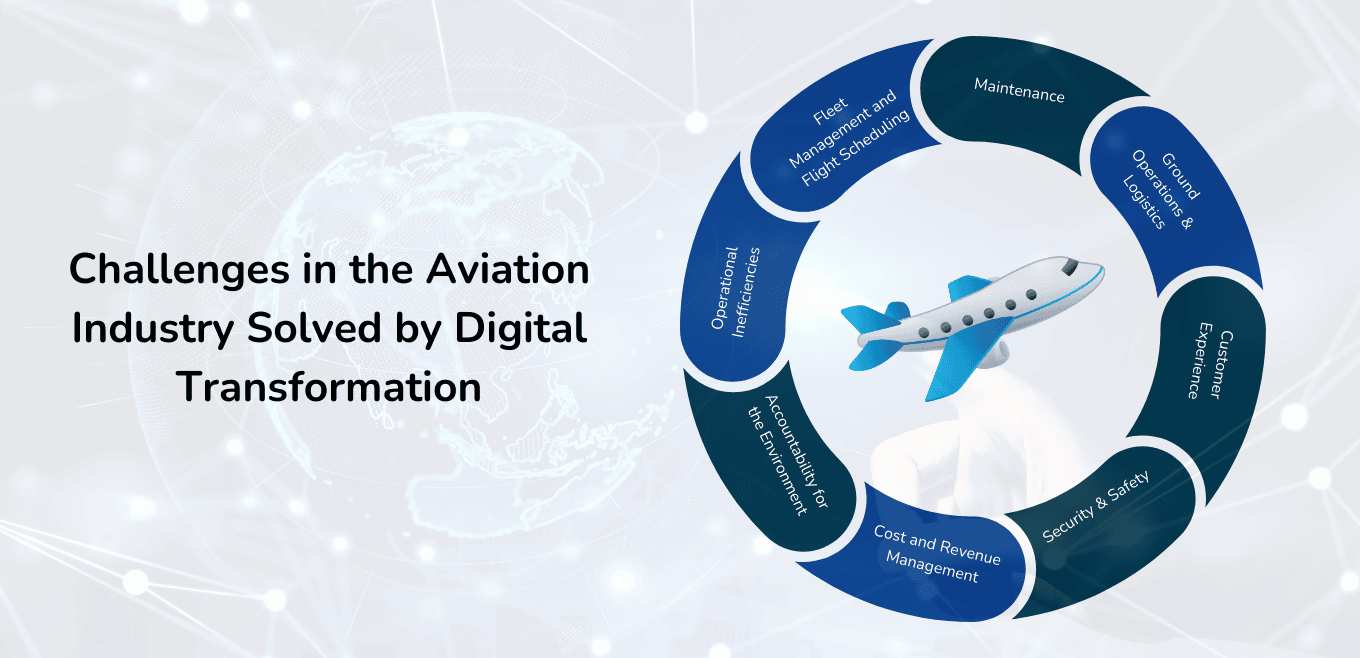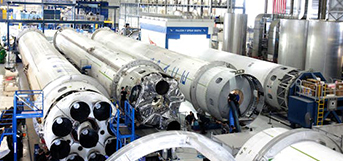Digital transformation and the airline sector are closely intertwined. As per Statista report, the global market size of airline software is projected to reach $7.81 billion this year. This investment highlights the industry’s dedication to digital transformation.
The shift in this change involves technologies like the Internet of Things (IoT), biometric systems, AR/VR, Artificial Intelligence and Machine Learning, and Big Data Analytics for decision-making. These trends improve consumer relations while streamlining operations. Those companies unaware of these trends and want to adopt digital transformation have reached the right place. We have curated information on how digital transformation has evolved in the Airline industry.
Why is Digital Transformation Important for the Aviation Industry?
Digital transformation is vital for airlines because it helps streamline tasks, automate processes, and optimize costs throughout their operations. By making operations more efficient, airlines can reduce costs significantly, which is crucial in any industry with narrow profit margins.
Additionally, airlines can offer more individualized and customer-focused products with digital transformation. As travelers demand individualized services and smooth travel experiences from reservation to arrival, this transformation becomes the need of the hour.
Business continuity also depends on digital transformation. Outdated and manual legacy systems may cause operational issues and security threats. Modern digital solutions guarantee constant, dependable operations and improve resilience.
Also, digital transformation facilitates improved consolidation and more efficient centralized control for large airline groups. This centralization streamlines operations and enhances decision-making processes.
Ultimately, it offers airlines, airports, and other aviation operations an opportunity to improve services and operations.
What are the Digital Trends and Technologies That Can Impact the Airline Industry?
After learning about digital transformation and its significance for the aviation industry, let’s look at some of the major trends in this field.
Artificial Intelligence (AI) and Machine learning (ML)
In aviation, AI & ML are becoming more popular. By enabling software product development methodologies, they assist operators in improving operational efficiency and safety while reducing the cost of new equipment by roughly 3% to 5%. For instance, Delta Air Line analyzes data from aircraft sensors using AI-driven PdM to anticipate possible mechanical problems before they become significant ones. This method lowers maintenance expenses and unscheduled downtime.
AI-powered Virtual Assistants in Internal Processes
1. Efficiency in Operations
Virtual assistants streamline internal operations in several areas, such as Ground Operations (GroundOPS), Maintenance Control Center (MCC), Operations Control Center (OCC), Training, and Flight Operations (FlightOps).
For example:
- FlightOps facilitates pre-flight preparations by allowing workers to rapidly access and ask questions about flight planning, schedule, and weather conditions.
- Engineers and technicians can learn new processes, make sure safety rules are followed, and ask questions about maintenance checklists and procedures for training and the MCC. This enhances conventional training techniques.
- Managers of operations control centers can leverage chatbots to quickly assist and interpret operational data, enabling faster decision-making during critical operations and ensuring safe and efficient procedures.
- Members of the ground crew can ask questions regarding operational protocols and get prompt responses, boosting efficiency, and minimizing, and improving passenger experience.
2. Commercial Optimization
Commercial departments can improve sales and customer service by integrating generative AI with CRM and finance systems. Through this connectivity, chatbots can tailor their responses according to previous contacts with clients, answering questions more quickly and fostering stronger bonds with them.
Explore the Potential of Future Technologies for Your Airline
Learn more about how embracing innovative management platforms can prepare your airline for tomorrow’s challenges and opportunities.
Automation
By increasing productivity and reducing human error, automation in aviation is revolutionizing airline and airport operations. Wait times are reduced and passenger flow is streamlined via automated check-in kiosks, luggage handling systems, and biometric security checks. Airlines may improve internal procedures, lessen employee workloads, and boost job satisfaction by integrating AI, ML, and Robotic Process Automation (RPA). Additionally, RPA streamlines and automates administrative work in back-office processes, freeing up employees to focus on more difficult problems.
Internet of Things (IoT) Connectivity
IoT-enabled sensors give airlines real-time aircraft health monitoring, which improves maintenance efficiency and decreases downtime. IoT usage in airports solves frequent problems like misplaced luggage, delayed flights, and poor customer service. For instance, Virgin Atlantic’s Boeing aircraft are equipped with IoT technology.
IoT and AI-powered predictive maintenance can anticipate possible aircraft problems before they arise, improving operational effectiveness and cost control.
Virtual reality (VR) and Augmented Reality (AR)
Two digital transformation trends that are improving the airline business are augmented reality and virtual reality. Virtual reality (VR) provides realistic pilot and crew training simulations that improve learning and recall. AR overlays technical data on equipment during maintenance, accelerating repairs and reducing errors.
VR is available to a restricted group of first and business-class passengers on Qatar Airways and British Airways as part of their in-flight entertainment packages.
Big Data and Analytics
Another beneficial disruptor in the aviation industry is big data and analytics. These techniques are essential to aviation because they help make wise decisions and increase productivity. Large amounts of data are collected by airlines from maintenance logs, passenger activity, and flights. Operators can improve customer service, fuel efficiency, and flight scheduling by analyzing this data. For example, ResearchGate claims that by using Big Data, identifying and fixing operational problems leads to on-time flights.
Dynamic pricing techniques also benefit from data and analytics insights. AI-powered algorithms are used by airlines to modify fares in response to competition, demand, and season. This guarantees maximum profits and competitive pricing.
Additionally, airlines can use artificial intelligence and data analytics to improve the customer journey and provide personalized services, such as targeted upselling possibilities and customized travel recommendations.
Cloud and Mobile Technology
Mobile and cloud technologies have transformed how airlines operate and engage with passengers. Travelers can seamlessly book, check-in, and board using mobile apps, while cloud-based solutions help airlines scale their IT infrastructure efficiently.
Cloud computing enhances collaboration and real-time data sharing across airline divisions, improving flexibility and responsiveness. Airlines can adjust computing resources based on demand, increasing capacity during peak travel seasons and reducing it when traffic subsides. This approach helps optimize operational costs while maintaining efficiency. As a key driver of digital transformation in aviation, cloud technology continues to enhance agility and innovation.
Challenges in the Aviation Industry Solved by Digital Transformation

Digital transformation is perfectly positioned to handle the many difficulties that the aviation industry faces, just like any other industry. Let’s examine these issues and how the aviation industry is changing as a result of digital solutions.
Operational Inefficiencies
Operational inefficiencies are one of the main issues facing the aviation industry that digital transformation attempts to solve. Paper-based communications, manual procedures, and fragmented systems (separated software solutions) are usually the causes of this difficulty. This results in a lack of real-time visibility into processes, human error in data processing, and a delayed flow of information.
These issues can be resolved by putting in place an integrated digital environment. Through real-time data and automated notifications, this system facilitates centralized data management, automated workflows, and proactive decision-making. By decreasing errors, speeding up processes, and giving stakeholders timely access, it increases operational efficiency.
Fleet Management and Flight Scheduling
Fleet management and flight schedule coordination can be difficult. If not carried out effectively, it may lead to underutilized aircraft and higher costs. Here, too, the digital revolution can be beneficial. While sophisticated fleet management software optimizes aircraft usage, maintenance schedules, and route planning for more efficient operations, AI & ML may produce adaptable flight schedules.
Maintenance
Delays and cancellations may result from unforeseen maintenance problems with planes. AI-powered predictive maintenance technologies can assist in foreseeing possible problems before they become more serious. By monitoring aircraft health and optimizing maintenance plans, data analytics may save downtime and expenses while guaranteeing more reliable operations.
Ground Operations & Logistics
Ineffective baggage handling and other logistics procedures can lead to delays, misplaced luggage, and increased operating expenses. IoT-enabled baggage handling systems, either by themselves or in conjunction with automated RFID tagging, can effectively sort and track baggage movements because of investments in digital transformation. Ground operations coordination is improved by real-time tracking technologies, which reduce delays and increase overall operational efficiency.
Customer Experience
Providing excellent services that are suited to the needs of a wide range of customers requires meeting their demands. By providing individualized services like unique trip suggestions and special deals, AI enhances customer service. Chatbots and AI-powered virtual assistants provide 24/7 customer service by effectively managing reservations and answering questions, which increases customer satisfaction.
Security & Safety
In the aviation sector, upholding strict safety regulations is crucial. However, a significant amount of resources are needed for this. The good news is that blockchain technology may be used to improve data security, guarantee transparency, and stop fraud in this field. Artificial intelligence (AI)-powered advanced surveillance may identify security concerns instantaneously and respond in real-time to efficiently maintain safety procedures.
Cost and Revenue Management
A key component of profitability is efficient cost control. But since the aircraft industry is so cutthroat, more assistance is required. This is another area where investment in digital aviation transformation might be beneficial. Data analytics, for instance, can identify inefficient locations and optimize spending. Furthermore, predictive maintenance techniques reduce maintenance costs, improving cost control, and AI services can optimize flight patterns, increasing fuel efficiency.
Accountability for the Environment
The aviation industry is one of the largest contributors to carbon emissions. Innovative solutions are needed to address this substantial greenhouse gas output. Once more, flight paths may be optimized using AI-powered analytics, which will improve fuel efficiency and drastically lower emissions. Additionally, this technology may track environmental performance and benchmarks, assisting airlines in fulfilling their legal requirements and ethically coordinating their corporate objectives.
To overcome these challenges a combination of innovative technologies and strong quality engineering processes to ensure that new solutions are effective, reliable, and efficient.
Solving Real-world Challenges in Aviation
Digital transformation is not just theoretical – it’s already delivering tangible results for airlines. For example, one of the challenges airlines face is managing outdated flight information systems. Let’s take a look at how a leading airline solved this issue and improved operational efficiency:
Case Study: Modernizing Flight Information Systems
A leading airline transformed its flight information systems with a unified Flight Information Display System (FIDS), providing real-time updates, enhancing passenger experience, and introducing new revenue streams through targeted ads.
Curious about how this solution could benefit your airline?
Driving Digital Transformation for Airlines with People10
The aviation industry is undergoing a significant digital transformation, and airlines must adapt to stay competitive. At People10, our dedicated software teams are committed to helping airlines embrace this change by leveraging innovative digital tools and technologies to optimize every aspect of their operations.
With deep expertise in aviation digital transformation, we work alongside airlines to enhance operational efficiency, improve customer experiences, and create personalized journeys for travelers. Whether it’s implementing AI-powered assistants to improve customer interactions, optimizing order management systems, delivering customized offers, driving upselling opportunities, or utilizing the scalability and flexibility of cloud technology, People10 is a trusted partner throughout the digital evolution process.
We also prioritize compliance with IATA regulations, ensuring that airlines maintain operational integrity and customer trust while staying ahead of industry standards. Our data and analytics services provide valuable insights that empower decision-making, helping airlines remain competitive in a dynamic market.
Partnering with People10 means gaining not just advanced digital solutions but a strategic ally dedicated to driving your airline’s growth and success in the digital age.
Keep Abreast of the Latest in Aviation Technology
Speak to our experts to discover how custom airline management systems can transform your operations and help you soar above the competition.
Author
Nandakumar excels in delivering diverse solutions from mobile apps to complex enterprise systems. At People10, he continues to drive success with a focus on customer satisfaction and innovative technology solutions.



